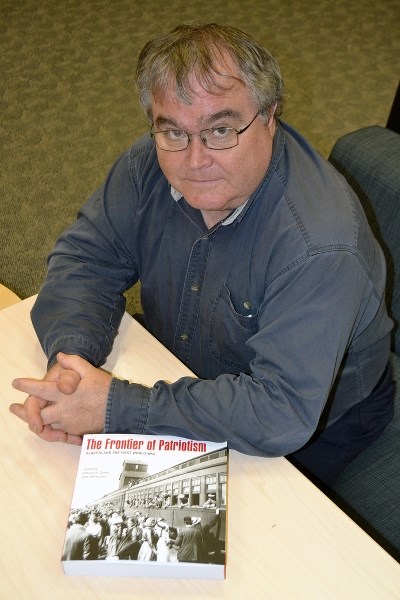When Michael Dawe was asked more than two years ago by the University of Calgary Press to contribute a story on how the First World War impacted Central Alberta he was challenged to provide his own interpretation.
He quickly found a story angle of heartbreak and loss but there was much more, particularly when over the course of five months of researching and writing he was able to “synthesize” the era's events, institutions and attitudes.
“By taking all the parts you get a different whole, a more rounded and a more complicated view of what it really meant,” said Dawe. “That generation is gone. It's sort of a way of trying to say, ‘OK look, even though that generation is gone, what they experienced and what they carried on for the rest of their lives still impacts us because it was just so deep and affected so many parts of our lives. The world changed, Central Alberta changed. Everything changed.”
Dawe's 4,800-word essay is one 40 offered in the new 564-page book, The Frontier of Patriotism: Alberta and the First World War, which was officially unveiled at The Military Museums of Calgary on Nov. 3. The book's mandate is to provide readers with a comprehensive examination of the province's involvement and contribution in the Great War; stories that provide snapshots of Albertans' experiences both on the battlefield and home front.
His interpretation of the war's impact on Central Alberta begins with a focus on how ill-prepared the country and region were when war broke out in 1914, and how the military was forced to quickly adjust from antiquated Boer War tactics of mounted infantry and highly mobile commando units, to static defensive positions and trenches.
“A lot of the young people here (Central Alberta) were very much attracted to the idea of going into the mounted rifle, highly mobile, semi-cowboy-like units. It worked well in the Boer War, but when they got overseas, and the first major battle was the Battle of St. Julien (1915), they realized riding horseback doesn't work against massed machine guns.”
These were the killing fields of the Great War, and the Battle of the Somme, which raged from July 1 to Nov. 18, 1916, became the ultimate iconic image of everything that was wrong with the war, said Dawe.
“They thought all we had to do was throw everything we've got and we will win. Instead they failed. They spent a million lives, the British and Allied forces, and they moved the front not even five kilometres,” said Dawe. “The Somme was just a phenomenal bloodbath.
“They said casualties were not any worse than what we expected and then they would see day after day these long lists of places, like Hill End, a little farming community north and east of Innisfail, where about a dozen guys died,” he added.
For the home front, Dawe paints a picture of a Central Alberta region once brazenly enthusiastic to fight for king and country. It was a war that was supposed to be short. But soon citizens faced an increasing number of heartbreaking death notices from the front, along with deepening sacrifices for their communities as the global conflict dragged on and on.
And when the war did finally come to an end, many survivors arrived home too damaged physically or mentally to become meaningful contributors to their frontier communities, most financially broken by the war effort. Then droughts and the flu plagued Central Alberta. Shell-shocked veterans faced chronic unemployment, and inadequate social services to help them integrate back to what was once normal living.
“Yes, we won and we said it was worth it, but for what? And that is what the message is – a shattering of preconceived notions on how to fight a war, not being prepared of how to rally resources, having a small country give until it hurts and afterwards it took a generation to recover,” said Dawe. “Even in remote Central Alberta, far removed from the war, and even though there was no fighting within thousands of miles from here, it shattered this part of the world.”
For more on The Frontier of Patriotism: Alberta and the First World War visit the University of Calgary Press website at https://press.ucalgary.ca/
Michael Dawe
"They thought all we had to do was throw everything we've got and we will win. Instead they failed. They spent a million lives, the British and Allied forces, and they moved the front not even five kilometres.The Somme was just a phenomenal bloodbath."



